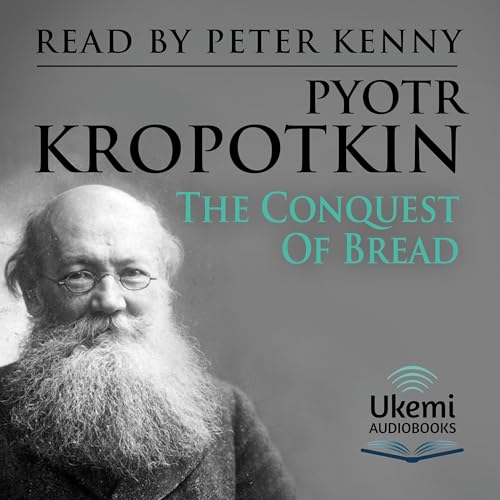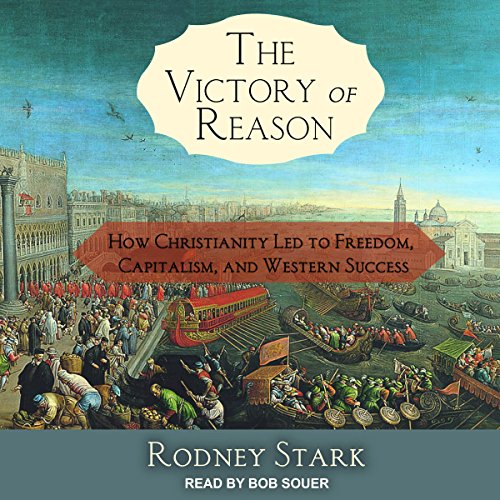
 Audible sample
Audible sample  Playing...
Playing... 
 Paused
Paused  Enjoy this audiobook free + more
Enjoy this audiobook free + more
Free title with your free trial!
$0.00$0.00
- Click above to get a preview of our newest plan - unlimited listening to select audiobooks, Audible Originals, and podcasts.
- You will get an email reminder before your trial ends.
- $7.95$7.95 a month after 30 days. Cancel online anytime.
Buy
-12% $22.57$22.57
The Wealth and Poverty of Nations: Why Some Are So Rich and Some So Poor
 Audible Audiobook
– Unabridged
Audible Audiobook
– Unabridged
The Wealth and Poverty of Nations is David S. Landes' acclaimed, best-selling exploration of one of the most contentious and hotly debated questions of our time: Why do some nations achieve economic success while others remain mired in poverty? The answer, as Landes definitively illustrates, is a complex interplay of cultural mores and historical circumstance. Rich with anecdotal evidence, piercing analysis, and a truly astonishing range of erudition, The Wealth and Poverty of Nations is a "picture of enormous sweep and brilliant insight" (Kenneth Arrow) as well as one of the most audaciously ambitious works of history in decades.
- Listening Length21 hours and 47 minutes
- Audible release dateJuly 27, 2021
- LanguageEnglish
- ASINB0992V4N62
- VersionUnabridged
- Program TypeAudiobook
 Read & Listen
Read & Listen
Get the Audible audiobook for the reduced price of $2.08 after you buy the Kindle book.
People who viewed this also viewed
- Audible Audiobook
- Audible Audiobook
- Audible Audiobook
- Audible Audiobook
- Audible Audiobook
People who bought this also bought
- Audible Audiobook
- Audible Audiobook
- Audible Audiobook
- Audible Audiobook
- Audible Audiobook
Related to this topic
- A History of the World in Seven Cheap Things: A Guide to Capitalism, Nature, and the Future of the Planet
 Audible Audiobook
Audible Audiobook - Audible Audiobook
- Audible Audiobook
- Audible Audiobook
- Audible Audiobook
Product details
| Listening Length | 21 hours and 47 minutes |
|---|---|
| Author | David S. Landes |
| Narrator | Walter Dixon |
| Whispersync for Voice | Ready |
| Audible.com Release Date | July 27, 2021 |
| Publisher | Tantor Audio |
| Program Type | Audiobook |
| Version | Unabridged |
| Language | English |
| ASIN | B0992V4N62 |
| Best Sellers Rank | #127,347 in Audible Books & Originals (See Top 100 in Audible Books & Originals) #99 in Economic Theory (Audible Books & Originals) #197 in Economic History (Audible Books & Originals) #558 in Theory of Economics |
Customer reviews
Customer Reviews, including Product Star Ratings help customers to learn more about the product and decide whether it is the right product for them.
To calculate the overall star rating and percentage breakdown by star, we don’t use a simple average. Instead, our system considers things like how recent a review is and if the reviewer bought the item on Amazon. It also analyzed reviews to verify trustworthiness.
Learn more how customers reviews work on Amazon-
Top reviews
Top reviews from the United States
There was a problem filtering reviews right now. Please try again later.
I read the book from cover to cover; then, as soon as I got to the end, I went back to the beginning and chewed through it a second time. My teen-age son, seeing all the marginal notes, wondered what I was up to, and his twin sister asked if I were studying for a quiz. The author takes you on a spectacular trip all over the world, digging into the birth of industrialism starting with water and wind power, then going into the clocks, files, tools, watches, math, looms and finally bursting forth into the steel making and manufacturing that brought wealth and power to Britain, the west in general and the USA in particular. What was thrilling about all this was the nitty gritty detail he goes into for each exploration, and I could just see him down on his hands and knees looking at the underside of a spinning jenny to see how it worked. Probably tried throwing the shuttle, too, or even making cloth. And when he was standing "inside the womb of the Industrial Revolution," I could actually see the pitted, baked bricks of that abandoned blast furnace, now a tourist museum in Coalbrooksdale. He really gets into things and that's what gives the history its punch. All the lessons can be taken to the abstract precisely because so much of the work is concrete and easy to read, which is probably why a lot of academicians don't like it.
Through his powerful lens I see, alas, what we have lost and continue to lose. We seem to be going the way of 16th & 17th C. Spain, buying the goods of others and forgetting how to make anything ourselves. I read smug economists who actually believe we are getting the best of China by trading our green paper money for goods made in China -- while ignoring the fact that when we put Americans out of work they lose their valuable skills, which then go to the Chinese who not only accumulate money but what is even more dangerous they learn our technologies quickly and at no cost to themselves. Can it ever be wise to enrich and arm a large potential enemy? I consider them an enemy not so much because they call themselves Communists, but because their aggressive form of totalitarian capitalism is pure Fascism. This is the state Mussolini had in mind but failed to pull off.
This book contains not only lessons but solutions to anyone who wants to see them. It should be required reading for every political candidate from dog catcher to President.
I salute the author for a job well done.
It is by the nature of such a book to be controversial, and Landes doesn't pull his punches; his approach is neoclassicist, although hardly a dogmatic one. He is rough on Postmodernists, Saidian Anti-Orientalists, French and Japanese protectionists, Spanish Roman Catholics, and many others. Among the reviews you'll read here, Landes irritates Catholics, third world enthusiasts, anti-Western intellectuals, extreme right wind Capitalists, anti-Japanese, and so on, and so on.
So, you've got controversy. But what is Landes actually saying? Well, in brief, Landes book focuses on three major reasons for Wealth/Poverty: Geography, Infrastructure, and Culture.
The discussion of Geography, early in the book, is at best half hearted. Some of the points seem valid - but you're always inclined to say 'On the other hand'. Are there really fewer diseases in Europe then in Africa? maybe, but transportation is easier. The black death annihilated a third of the European population in the 13th century. Does Heat makes labour harder and less efficient? I guess the builders of the Pyramids haven't heard Landes's thesis - or maybe hardships can be overcomming with whipping.
The best parts of the book deal with Infrastructure. In these, Landes has three main themes: Freedom, Capitalism and Science (Or, if you wish, Anarchy, Greed and Heresy).
Freedom allows people to do things. Landes portrayal of the centrally planned economies of ancient China, where the Emperor ruled everything, is powerful, and it seems to play a large role in the lack of initiative in China, despite the great achievements.
Capitalism, most noticeably in the form of Greed and Competition, drives people forward. Again, Landes comparison between the Chinese and the European Sea quests are enlightening. Europeans went in small ships, eager to outdo the competition and to come back making a fortune. The Chinese went with huge Ships, symbols of the empire rather than instruments of trade. They were unprofitable, victims of the ruler's whim, and, without a strong faction of interested merchants, had no chance of continuing throughout. Also interesting is that Europeans went looking for India and spices, while China was self-sufficient.
Science - Chinese science was much more sophisticated than European science back in the year 1,000. The Indians have invented the zero. But nowhere except in Europe did science work methodically, nowhere else was it progressive. Newton is famous of saying that he stood on the shoulder of giants - discoveries in China and the rest of the world were rarely followed up - gunpowder was discovered in China much before it was in Europe, but the Chinese never used it for weapons. In Europe, it became part of the war methods almost immediately. Landes discussions of clocks and glasses are particularly telling.
The Third Element - Culture - is the one with which I have the most trouble. Landes repeatedly attacks economists for discounting culture (for example in the last chapter, page 517 in my edition). He claims that they disregard it because it can't be quantified. Wrong. The reason Economists distrust culture is because it is such a 'one size fits all' argument. Japanese responds to the west was everything the Chinese should have done but didn't. ... Culture. Arab nations are stuck well behind everyone else, despite the great advantage they have in the shape of oil. ... Culture. Asians manage to pull themselves along, while most of the third worlders can't. ... Well, culture, again.
I'm not saying that Culture plays no part. Obviously it does. But it becomes an obstacle to understanding, and Landes can support it only with anecdotal evidence (a lovely and touching story of a Japanese woman), and unanswered question (Is Islam a cause for the suppression of women? maybe).
Despite this problem, this is a fascinating book. Yes, it is a little too pro-Western. The problem is really more one of emphasis than one of facts - in my view, Landes is pretty close the mark usually, but he much underestimates the responsibility of the West for African poverty. Something's are left relatively unexplained - the current fast rise of China, which might undertake the point Landes made about the vitality of Freedom
But ultimately, as Landes acknowledges, no one book can solve the question of poverty and wealth. The answer is necessarily multi-faceted. 'The Wealth and Poverty of Nations' (neat name, also) is a well-written and intelligent treatment of the question.


















